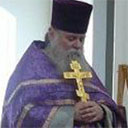Orthodox Christians revere Saint Anthony as the “first of monks” and the founder of monasticism. True, others before him had adopted the life of total commitment to prayer and self-discipline (asceticism) which characterize the monastic way, but St. Anthony’s example and spiritual gifts encouraged and popularized monasticism. The great spiritual teachers who came later all achieved knowledge and insight by following the divine way which St. Anthony pioneered. As his kontakion says, he is truly a “father of fathers.”
But what about us who do not live in the monastery? Do St. Anthony and the great Church Fathers have anything to say to our life in the world? Should we forget the teachings of St. Anthony and the monastic saints, honoring them as men and women of God, but ignoring the example of their lives and the content of their instruction?
The answer to these questions is, No. The teachings of the Fathers are certainly relevant even to us outside the monasteries. The monastic saints teach and demonstrate many truths of the Gospel which we can apply to our daily lives in our families and our secular vocations.
The center of the monastic way is asceticism”, that is, a regimen of spiritual and physical discipline involving prayer, fasting, self-denial, and obedience. Asceticism is something that we practice even in the world. Christ calls us to pray, to fast, to deny ourselves by humility and repentance, and to obey the commandments of God. The difference between our asceticism and that of a monk or nun is that they try to live the commandments of Christ in their most literal and concrete manner. Before becoming a monk, St. Anthony enjoyed an existence of wealth and luxury. Then one day in church he heard our Lord’s words to another rich young man, “Sell what you have and give to the poor, and come, follow me (Matthew 19:21), These words pierced his very soul. In an instant, Anthony knew that Christ was not speaking only to that other man two centuries before but that the Lord was also directing this demand to him. He immediately sold his possessions, distributed the profits as alms, provided for the welfare of his young sister, and went out to the solitude of the desert.
Christ does not make this same demand of all; He does not require all of us to follow these words literally. He does, however, insist on a total commitment to Him and to His Kingdom, whatever our circumstances or social status may be. Monasticism reminds us that we must be necessary what is not, and to consider of first importance that must be secondary. We neglect to fast because we “just can’t do without” certain foods. We ignore good stewardship because we have to keep up a certain lifestyle. We cling to bad habits because “that’s the way we are.” None of these excuses is true, nor are any of the other rationalizations we use to justify our sins. The great monastic saints like Saint Anthony remind us of this fact.
Too often we are like Martha, the sister of Lazarus, who was “busy ‘with much serving” (Luke 10:38-42). We forget that it was the other sister, Mary, who “chose the better part,” to sit at our Lord’s feet, to hear His words, and to strengthen our relationship with Him, Of course, someone must do Martha’s work, the “serving” in the world. But we must remember that we can be a “Martha”, fulfilling our worldly vocation, only if we have first been a “Mary”, drawing near and savoring our closeness to Christ The monks are the Marys of the Church, reminding us what must come first, lest we become distracted with our activity in the world and forget that our true goal is the Kingdom of God.
***


